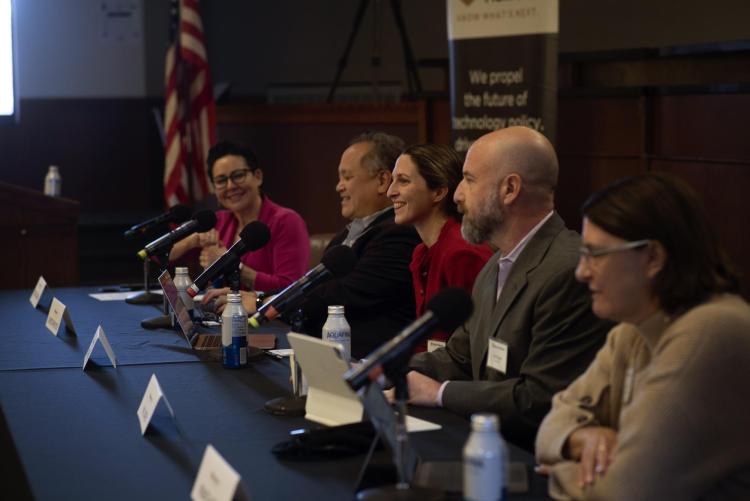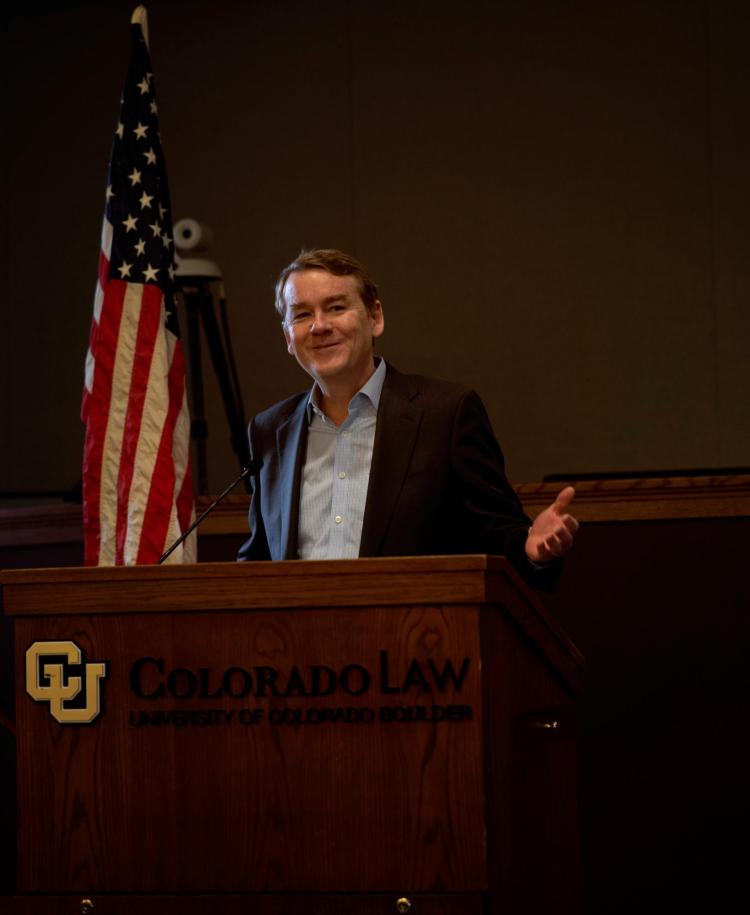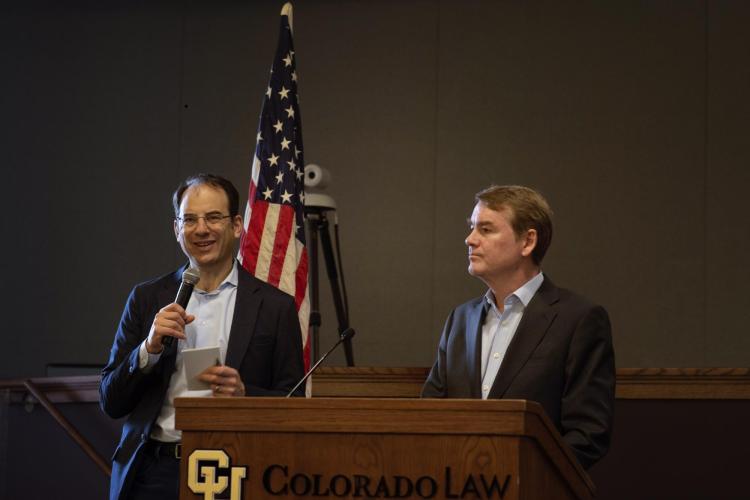Silicon Flatirons Conference Explores the Internet’s Midlife Crisis

Professor Kristelia García moderates a panel discussion on "The Role of Competition Policy in Mediating the Crisis."
More than two decades since the University of Colorado Law School’s Silicon Flatirons Center for Law, Technology, and Entrepreneurship launched its first inquiry into the nascent “digital broadband migration,” the internet and its constituent players have evolved from a disruptive, competitive technology to the cornerstone of nearly every aspect of the modern world.
The center’s 2023 flagship conference, titled “The Internet’s Midlife Crisis,” convened a range of leaders from the technology industry, government, media, and academia, including U.S. Senator for Colorado Michael Bennet and Colorado Attorney General Phil Weiser, at Colorado Law Feb. 5-6.
More than 25 technology leaders, including professors from Georgetown, Columbia, and University of California, Berkeley, evaluated the good, the bad, and the ugly—where we started and where we are headed as we grapple with the challenges created by the internet’s midlife crisis.

U.S. Senator for Colorado Michael Bennet
In his keynote speech, Sen. Bennet discussed the Digital Platform Commission Act, which he introduced to establish a new commission to oversee Silicon Valley. He also called for other industry changes, including the removal of TikTok from Apple and Google’s app stores over security concerns.
“These digital platforms have remained almost entirely unregulated, moving fast, breaking things and leaving the rest of us to glue something of our world back together,” he said.
Attorney General Weiser, former dean of Colorado Law, moderated a panel discussion titled “The Future of Agencies,” which explored the ability of current consumer protections to meet the challenge of internet platforms.
Attendees also heard from Tim Wu, a legal scholar and former special assistant to President Biden for competition and technology policy. Known for his significant contribution to antitrust and communications policy, Wu led Washington’s attempts to more aggressively check corporate giants, including the largest tech companies.
In a fireside chat, Alan Davidson, assistant secretary of commerce for communications and information and National Telecommunications and Information Administrator at the U.S. Department of Commerce, and Anna Gomez, senior advisor for international information and communications policy at the U.S. Department of State’s Bureau of Cyberspace and Digital Policy, discussed the evolution and development of the Internet.
“When I started in this field in 1995, there were 40 million people online. Today there are 5 billion,” said Davidson, whose office tackles policy issues like privacy, harmful content, online censorship, and cybersecurity. “The Internet has become the essential communication medium of our time.”
Blake E. Reid ‘10, clinical professor of law specializing in technology policy and telecom and disability law, spearheaded this year’s conference.
“The internet has become a cornerstone of modern society for better and for worse, and many believe it should be ubiquitously available for everyone. We need to find ways to address and overcome these challenges to make it a safe and equitable place for everyone,” he said.
Silicon Flatirons’ annual conference is a leading forum for policymakers to evaluate emerging policy challenges in the information industries. Termed “the Davos of telecom” by Internet pioneer Vinton Cerf, the conference has been the home of leading discussions, including the first about “network neutrality” regulation–a term coined by Tim Wu at a Silicon Flatirons conference.
Jackson McNeal ‘24 attended the conference and was involved in the planning as a member of the Silicon Flatirons Student Group. In addition to the conference content, he noted the importance of the networking opportunities it presented.
“This conference in particular had some very big names in the technology, law, and policy sphere, and that opportunity to build a connection and maintain it is really valuable,” McNeal said. “It's a small field and that face time is a pretty rare opportunity that I've been really grateful for.”
The proceedings from the conferences will be published in Colorado Law’s student-run Colorado Technology Law Journal.
Founded by Colorado Attorney General Phil Weiser in 1999, Silicon Flatirons inspires and drives an inclusive and comprehensive approach to technology law, policy, and entrepreneurship. At the University of Colorado Law School, Silicon Flatirons supports interdisciplinary events and programs, runs year-round student programs, and serves as a think-and-do tank in law, technology, and entrepreneurship.
“I’m proud to be associated with this excellent conference,” said Brad Bernthal ‘01, executive director of Silicon Flatirons. “Professor Blake Reid masterfully crafted a big yet intellectually coherent event. And our Silicon Flatirons staff’s hard work paid off, too. This was a big win for Colorado Law and Silicon Flatirons.”

Colorado Attorney General Phil Weiser and Senator Michael Bennet
Watch all conference sessions.
See event coverage:
Washington Post: Senate Democrat renews fight for Silicon Valley watchdog
Boulder Daily Camera: Sen Michael Bennet address internet’s midlife crisis at CU Boulder conference
CU Boulder Today: 7 things to know about the internet’s midlife crisis
Watch Senator Bennet's Speech
[video:https://www.youtube.com/watch?v=7hFO72BDODU&list=PLTAvIPZGMUXOXFXfWOWewSnfAwEL9CocK&index=1]


